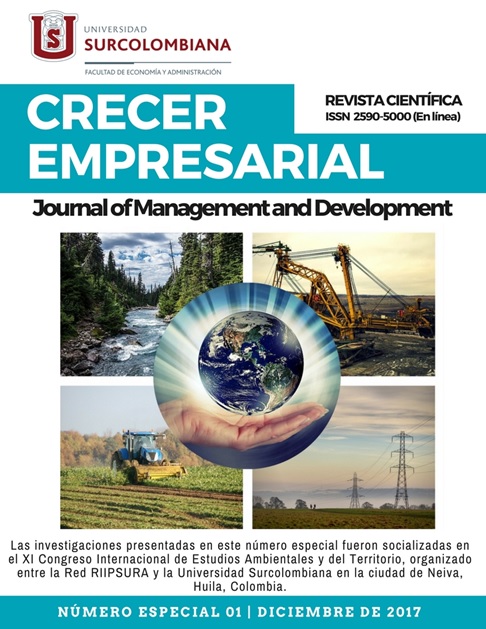TURISMO SOSTENIBLE Y RESIDUOS SÓLIDOS: UNA PRIMERA APROXIMACIÓN AL ESTADO DEL ARTE
##plugins.themes.bootstrap3.article.main##
El turismo es una actividad económica importante con repercusiones sociales, económicas, políticas y ambientales que influye en las personas, lugares, prácticamente en todos los rincones del mundo. Sin embargo, la cantidad de residuos sólidos generados son considerados una de las principales consecuencias negativas derivadas de la actividad turística, debido a que afecta el paisaje, contamina las aguas y puede representar daños potenciales a la biodiversidad[1], entre otras consecuencias. Este documento presenta una revisión del estado del arte del turismo sostenible y los residuos sólidos, se procura identificar y analizar las investigaciones realizadas durante el periodo 2004 – 2016, correspondiente a 12 años. Los resultados tratan de dar respuesta a qué se ha investigado, quién trata estos temas, dónde se encuentran los principales focos de investigación y qué metodologías han sido utilizadas. Con la presente ponencia se pretende establecer un punto de partida sobre este tema, con el fin de profundizar el conocimiento del turismo sostenible y los residuos sólidos e identificar posibles tendencias de investigación.
[1] Referido a la diversidad de flora y fauna
Descargas
##plugins.themes.bootstrap3.article.details##
Anctil, A., & Blanc, D. L. (2016). An educational simulation tool for integrated coastal tourism development in developing countries. Journal of Sustainable Tourism, 24(5), 783-798. doi: 10.1080/09669582.2015.1091463
Arbulú, I., Lozano, J., & Rey-Maquieira, J. (2016). The challenges of municipal solid waste management systems provided by public-private partnerships in mature tourist destinations: The case of Mallorca. Waste Management, 51, 252-258. doi: 10.1016/j.wasman.2016.03.007
Behzad, N., Ahmad, R., Saied, P., Elmira, S., & Bin, M. M. (2011). Challenges of solid waste management in Malaysia. Research Journal of Chemistry and Environment, 15(2), 597-600.
Benito-López, B., Moreno-Enguix, M. D. R., & Solana-Ibañez, J. (2011). Determinants of efficiency in the provision of municipal street-cleaning and refuse collection services. Waste Management, 31(6), 1099-1108. doi: 10.1016/j.wasman.2011.01.019
Bruzzi, L., Boragno, V., Serrano-Bernardo, F. A., Verità, S., & Rosúa-Campos, J. L. (2011). Environmental management policy in a coastal tourism municipality: The case study of Cervia (Italy). Local Environment, 16(2), 93-113. doi: 10.1080/13549839.2011.558075
Caramiello, C., Fabbri, L., Marzi, M., & Tatàno, F. (2009). Tourism impact on municipal solid waste: Elaborations for the case study "Adriatic Riviera" (Province of Rimini, Italy). 7th International Conference on Ecosystems and Sustainable Development, ECOSUD 2009, 122, 471-482. doi: 10.2495/ECO090431
Charles, D. (2013). Sustainable tourism in the Caribbean: The role of the accommodations sector. International Journal of Green Economics, 7(2), 148-161. doi: 10.1504/IJGE.2013.057447
Chertow, M. R., & Eckelman, M. J. (2009). Using material flow analysis to illuminate long-term waste management solutions in oahu, Hawaii. Journal of Industrial Ecology, 13(5), 758-774. doi: 10.1111/j.1530-9290.2009.00159.x
De Oliveira, A. L., & Turra, A. (2015). Solid waste management in coastal cities: Where are the gaps? Case study of the North Coast of São Paulo, Brazil. Journal of Integrated Coastal Zone Management, 15(4), 453-465. doi: 10.5894/rgci544
Er, A. C. (2010). The nascent development of ecotourism in Lagong Hill. American Journal of Applied Sciences, 7(12), 1528-1531.
Hernández, R., Fernández, C., & Baptista, P. (2007). Fundamentos de Metodología de la investigación. McgrawHill. Mexico.
Kapiki, S. (2012). Implementing sustainable practices in greek eco-friendly hotels. Journal of Environmental Protection and Ecology, 13(2 A), 1117-1123.
Kaseva, M. E., & Moirana, J. L. (2010). Problems of solid waste management on Mount Kilimanjaro: A challenge to tourism. Waste Management and Research, 28(8), 695-704. doi: 10.1177/0734242X09337655
Kasimu, A. B., Zaiton, S., & Hassan, H. (2012). Hotels involvement in sustainable tourism practices in Klang Valley, Malaysia. International Journal of Economics and Management, 6(1), 21-34.
Kuniyal, J. C. (2005). Solid waste management in the himalayan trails and expedition summits. Journal of Sustainable Tourism, 13(4), 391-410. doi: 10.1080/09669580508668564
Maal-Bared, R. (2006). Comparing environmental issues in Cuba before and after the Special Period: Balancing sustainable development and survival. Environment International, 32(3), 349-358. doi: 10.1016/j.envint.2005.08.002
Macharia, J. M., Thenya, T., & Ndiritu, G. G. (2010). Management of highland wetlands in central Kenya: The importance of community education, awareness and eco-tourism in biodiversity conservation. Biodiversity, 11(1-2), 85-90. doi: 10.1080/14888386.2010.9712652
Meade, B., & Pringle, J. (2001). Environmental management systems for caribbean hotels and resorts. Journal of Quality Assurance in Hospitality and Tourism, 2(3-4), 149-159. doi: 10.1300/J162v02n03_09
Musora, O., Mbaiwa, J. E., & Murray-Hudson, M. (2017). Tourists' perceptions of environmental impacts of tourism development on water resources in the Okavango Delta, Botswana. African Journal of Hospitality, Tourism and Leisure, 6(3).
Piippo, S., Juntunen, A., Kurppa, S., & Pongrácz, E. (2014). The use of bio-waste to revegetate eroded land areas in Ylläs, Northern Finland: Toward a zero waste perspective of tourism in the Finnish Lapland. Resources, Conservation and Recycling, 93, 9-22. doi: 10.1016/j.resconrec.2014.09.015
Radwan, H. R. I., Jones, E., & Minoli, D. (2010). Managing solid waste in small hotels. Journal of Sustainable Tourism, 18(2), 175-190. doi: 10.1080/09669580903373946
Ramírez, C. (2006). Visión integral del turismo. Fenómeno dinámico universal. México: Trillas.
Salem, M. M., & El-Shimy, H. (2012). Sustainable tourism within an eco-city context: Analytical study for the master plan of Siwa ity, Egypt. 4th International Conference on Harmonisation between Architecture and Nature, ARC 2012, 165, 3-14. doi: 10.2495/ARC120011
Semernya, L., Ramola, A., Alfthan, B., & Giacovelli, C. (2017). Waste management outlook for mountain regions: Sources and solutions. Waste Management and Research, 35(9), 935-939. doi: 10.1177/0734242X17709910
Shamshiry, E., Nadi, B., Bin Mokhtar, M., Komoo, I., Saadiah Hashim, H., & Yahaya, N. (2011). Integrated models for solid waste management in tourism regions: Langkawi Island, Malaysia. Journal of Environmental and Public Health, 2011. doi: 10.1155/2011/709549



